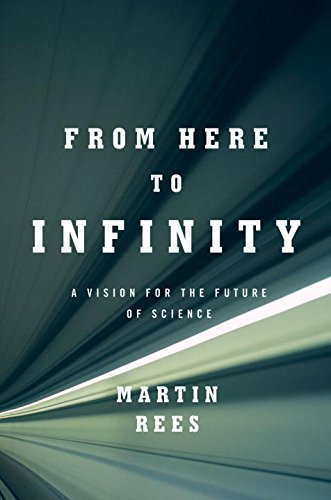
From Here to Infinity
A Vision for the Future of Science
کتاب های مرتبط
- اطلاعات
- نقد و بررسی
- دیدگاه کاربران
نقد و بررسی

February 27, 2012
Rees, Britain’s former astronomer royal and a scientist’s scientist, offers his thoughts on how science should navigate its ongoing interaction with culture, politics, and ethics in the 21st century. Rees’s major thesis is that scientists, politicians, and laypeople must engage in meaningful dialogue about how science should be deployed to address the century’s looming dangers: “the threats without enemies.” This list includes developing reliable energy sources, a burgeoning world population, climate change, diminishing biodiversity, the misuse and unintended consequences of gene manipulation, and the design of drugs that may alter human beings themselves. Rees offers no set-piece solutions, but instead suggests rational and achievable responses—some scientific, some sociological—that might ameliorate these potential dangers. He champions better funded universities and the idea that science should remain agnostic as to religion; he says that the benefits of globalization must be fairly shared, and, most intriguingly, “There are doors that science could open but which are best left closed.” There is enough hard science for this book (based on a series of lectures) to satisfy readers concerned with science’s future horizons, as well as a surfeit of wisdom on science and its role in society at large. Agent: George Lucas, InkWell Management.

May 1, 2012
The fate of the world demands that scientists and the public communicate better, writes British astronomer and former president of the Royal Society Rees (Our Final Hour: A Scientist's Warning, 2003, etc.). Expanded and directed at an American audience, these are four of the distinguished Reith lectures, delivered annually over BBC radio by renowned thinkers beginning in 1948 with Bertrand Russell. Readers will learn that 21st-century science impinges on us more than ever and in ways that transform our lives, usually, but not always, for the better. It is the one "truly global culture, transcending all boundaries of nationality and faith." America is definitely the leader, and Rees uses American institutions as examples of how to do it right (our universities are the best; our entrepreneurs the most entrepreneurial), with exceptions (our politicians who proudly reject science). No Cassandra, he reviews our planet's looming problems, from climate change to overpopulation to nuclear war, emphasizing that there are no solutions outside of science. Since the future depends on our youth, he stresses that scientists are cool, pointing out that Einstein was a hip young guy when he made his dazzling discoveries, not the disheveled, elderly man portrayed by the media of the time. He also warns about the "tendency for long-term strategies, however important, to be trumped by more immediate issues that can be resolved within an electoral cycle." David Deutsch's The Beginning of Infinity (2011) provides a more powerful exploration of this theme, but Rees delivers shrewd insights into how science can lead us to a better future.
COPYRIGHT(2012) Kirkus Reviews, ALL RIGHTS RESERVED.

April 1, 2012
Invited to deliver the 2010 BBC Reith Lectures, in which an eminence expounds on his specialty, Rees talked about science's relevance to the future in broad terms, as the four talks reworked for this short tome indicate. The first mulls the extent to which scientists should involve themselves in public policy. So long as they don't invoke their authority as experts in spheres beyond their ken, Rees, a former incumbent of Britain's most prestigious scientific posts and author of works of popular science, in effect says to scientists, have at it. The second lecture picks three issues Rees regards as the most threatening to humanity and, therefore, suitable for science's public activismworld population and food supply, climate change (the major worry in Rees' Our Final Hour, 2003), and energy supplies. The third and fourth lectures are, respectively, about Rees' predictions of future discoveries and his suggestions for enhancing the training of scientists in this era of globalization. A prominent figure and accessible writer, Rees will attract interest to his scientific observations and prognostications.(Reprinted with permission of Booklist, copyright 2012, American Library Association.)

























دیدگاه کاربران